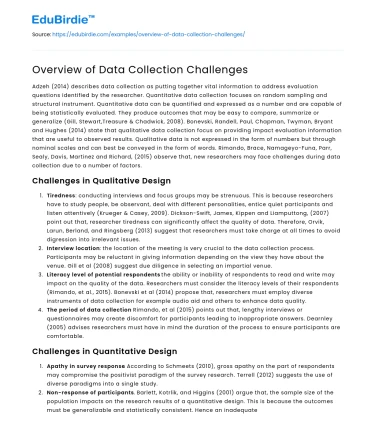Adzeh (2014) describes data collection as putting together vital information to address evaluation questions identified by the researcher. Quantitative data collection focuses on random sampling and structural instrument. Quantitative data can be quantified and expressed as a number and are capable of being statistically evaluated. They produce outcomes that may be easy to compare, summarize or generalize (Gill, Stewart,Treasure & Chadwick, 2008). Bonevski, Randell, Paul, Chapman, Twyman, Bryant and Hughes (2014) state that qualitative data collection focus on providing impact evaluation information that are useful to observed results. Qualitative data is not expressed in the form of numbers but through nominal scales and can best be conveyed in the form of words. Rimando, Brace, Namageyo-Funa, Parr, Sealy, Davis, Martinez and Richard, (2015) observe that, new researchers may face challenges during data collection due to a number of factors.
Challenges in Qualitative Design
- Tiredness: conducting interviews and focus groups may be strenuous. This is because researchers have to study people, be observant, deal with different personalities, entice quiet participants and listen attentively (Krueger & Casey, 2009). Dickson-Swift, James, Kippen and Liamputtong, (2007) point out that, researcher tiredness can significantly affect the quality of data. Therefore, Orvik, Larun, Berland, and Ringsberg (2013) suggest that researchers must take charge at all times to avoid digression into irrelevant issues.
- Interview location: the location of the meeting is very crucial to the data collection process. Participants may be reluctant in giving information depending on the view they have about the venue. Gill et al (2008) suggest due diligence in selecting an impartial venue.
- Literacy level of potential respondents: the ability or inability of respondents to read and write may impact on the quality of the data. Researchers must consider the literacy levels of their respondents (Rimando, et al., 2015). Bonevski et al (2014) propose that, researchers must employ diverse instruments of data collection for example audio aid and others to enhance data quality.
- The period of data collection. Rimando, et al (2015) points out that, lengthy interviews or questionnaires may create discomfort for participants leading to inappropriate answers. Dearnley (2005) advises researchers must have in mind the duration of the process to ensure participants are comfortable.
Challenges in Quantitative Design
- Apathy in survey response. According to Schmeets (2010), gross apathy on the part of respondents may compromise the positivist paradigm of the survey research. Terrell (2012) suggests the use of diverse paradigms into a single study.
- Non-response of participants. Barlett, Kotrlik, and Higgins (2001) argue that, the sample size of the population impacts on the research results of a quantitative design. This is because the outcomes must be generalizable and statistically consistent. Hence an inadequate sample size will weaken the correctness of the results. Hox (2007) suggests that engaging the respondents and emphasizing the benefits of the research to them and preparing them in advance may improve the non-response rate.
- Random sampling: sampling is time consuming. Therefore, an opportunistic sampling is an option although it may affect the generalization from the research findings (Onwuegbuzie, & Johnson, 2004). Carr (2009) suggests due diligence to improve the quality of the random sampling.
Summary
Accurate data collection is very important in achieving the integrity. Therefore, irrespective of the study area, the data collection instrument whether newly developed, existing or modified, with clearly defined instructions for their right application, will significantly reduce errors and improve data quality.
Save your time!
We can take care of your essay
- Proper editing and formatting
- Free revision, title page, and bibliography
- Flexible prices and money-back guarantee
Did you like this example?
Make sure you submit a unique essay
Our writers will provide you with an essay sample written from scratch: any topic, any deadline, any instructions.
Cite this paper
-
APA
-
MLA
-
Harvard
-
Vancouver
Overview of Data Collection Challenges.
(2022, October 28). Edubirdie. Retrieved December 22, 2024, from https://edubirdie.com/examples/overview-of-data-collection-challenges/
“Overview of Data Collection Challenges.” Edubirdie, 28 Oct. 2022, edubirdie.com/examples/overview-of-data-collection-challenges/
Overview of Data Collection Challenges. [online].
Available at: <https://edubirdie.com/examples/overview-of-data-collection-challenges/> [Accessed 22 Dec. 2024].
Overview of Data Collection Challenges [Internet]. Edubirdie.
2022 Oct 28 [cited 2024 Dec 22].
Available from: https://edubirdie.com/examples/overview-of-data-collection-challenges/
copy






 Stuck on your essay?
Stuck on your essay?

